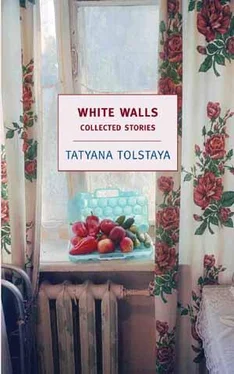In the fall, Peters took great pleasure in hating his home town, and the city repaid him in kind: it spat icy streams from pounding roof tops, filling his eyes with opaque, dark flows, shoved especially damp and deep puddles under his feet, slapped the cheeks of his nearsighted face, his felt hat, and his tummy with lashes of rain. The slimy buildings that bumped into Peters were purposely covered with tiny white mushrooms and a mossy toxic velvet, and the wind, which had come from big highwayman roads, tumbled around his soggy feet in deathly tubercular figure eights.
He took his post with the bouquet, and October poured from the skies, and his galoshes were like bathtubs, and the newspaper wrapped three times around the expensive yellow flowers fell apart into shreds, the time came and went and Valentina did not come and would not come but he stood there chilled through to his underwear, to his white hairless body sprinkled with tender red birthmarks.
The clock struck four. Peters shoved his bouquet in a garbage can. Why wait? He understood it was stupid and too late to learn German, that the lovely Valentina, brought up among athletic and vernal youths, would merely laugh and step over him, lumpy and broadwaisted; not for him were fiery passions and light steps, fast dances and leaps on the beam, or casually bought damp April violets, or the sunny wind from the gray waters of the Neva, or laughter and youth; that all attempts were futile, that he should have married his own grandmother and quietly melted away in the warm room to the ticking of the clock, eating sugar buns and planting his old stuffed rabbit in front of his plate for coziness and amusement.
He was hungry, and he went to the first friendly light he saw, bought some soup, and sat down next to two beauties eating patties with onions and blowing away the foggy skin on their cooling pinkish cocoa.
The girls were chattering about love, of course, and Peters heard the story of a certain Irochka, who had been working a long time on a comrade from fraternal Yemen, or maybe Kuwait, in hopes that he would marry her. Irochka had heard that there in the sandy steppes of the Arabian land, oil was as plentiful as berries, every decent man was a millionaire and flew in his own jet with a gold toilet seat. It was that gold seat that drove Irochka crazy, for she grew up in the Yaroslavl region, where the conveniences were three walls without the fourth with a view of the pea field; all in all, it was like Ilya Repin’s painting Space. But the Arab was in no hurry to wed, and when Irochka put it to him straight, he replied in the vein of, “Oh, yeah, your mother wears army boots. So long, sucker!” and so on, and tossed Irochka out with her pathetic belongings. The girls paid no attention to Peters, and he listened and felt sorry for the unknown Irochka and pictured the pea-covered expanses of Yaroslavl, trimmed around the horizon with dark, wolf-filled forests, melting in the blissful silence under the blue shimmer of the northern sun, or the dry, grim squeak of millions of sand grains, the taut push of a desert hurricane, the brown light through the deep murk, forgotten white palaces filmed with mortal dust or enchanted by long-dead sorcerers.
The girls moved to the story of the complicated relationship of Olya and Valéry, of Anyuta’s heartlessness, and Peters, drinking his broth, listened openly, entering someone else’s story invisibly, he came in close contact with someone’s secrets, he was standing at the door with bated breath, he felt, smelled, and saw, as if in a magical movie, and it was all unbearably accessible—just reach out—flickering faces, tears in injured eyes, explosions of smiles, sunlight in hair, cascading pink and green sparks, dust motes in the ray and the heat of warmed parquet floors, creaking nearby, in that strange, happy, and lively life.
“We’re done, let’s go!” one beauty commanded the other, and spreading their transparent umbrellas, like signs of another, higher existence, they floated out into the rain and rose into the skies, into the blue beyond the clouds, hidden from his eyes.
Peters selected a rough piece of cardboard from the plastic glass serving as napkin holder and wiped his mouth. Life roared by, bypassing him, and hurried on, like a swift-flowing river goes around a heavy mound of rocks.
The cleaning woman whirled like a sand storm among the tables, flipped her rag in Peters’s face, and deftly picked up twenty dirty dishes and disappeared in the yeasty air.
“It’s not my fault,” Peters said to someone. “It’s not my fault at all. I want to participate. But they won’t take me. No one wants to play with me. Why? But I’ll try harder, I’ll win!”
He went out—under icy splashes, under the cold, lashing water. I’ll win. Win. I’ll clench my teeth and push on through. And I will learn that damned language. There, on Vasiliyevsky Island, in the dampest of Leningrad’s damp, Elizaveta Frantsevna is waiting, swimming like a seal or mermaid, mumbling easily in the dark German tongue. He would come and they would chatter together. O Tannenbaum! O, I repeat, Tannenbaum! How does it go after that? I’ll find out when I get there.
Oh, well, farewell Valentina and her quick sister, ahead lies only an old German woman—he braced himself…. Peters imagined his path, his looplike track in the wet city, and failure, running on his tail, sniffing the waffle prints of his shoes, and the old woman at the end of his path, and in order to confuse fate he hailed a taxi and sailed through the rain—steam rose from his feet, the driver was grim, and he wanted to get out right away. Tacka-tacka-tacka-tacka, ticked away his money.
“Stop here.”
A doorman guarded the entrance to a gilded place—a door into a subcellar, and beyond it muffled music blared, and lamps shone in the windows like long tubes of acid syrup. Young men—all pretenders for Valentina’s hand, farewell Valentina— huddled in front of the door, teeth chattering in the whirlwinds of rain, there was no room in the restaurant, but the doorman, deceived by Peters’s solid appearance, let him in, and Peters passed through and two others slipped in by his side. A good place. Peters took off his hat and raincoat in a dignified manner, promised a tip with his eyes, stepped into the noisy room, and trumpeted his arrival in his handkerchief. A fine place. He ordered a pink cocktail, a pagoda pastry, drank, ate, drank some more, and relaxed. A very, very fine place. And at his elbow appeared a moth-girl, from out of thin air, from the colored cigarette smoke; her red, green dress—the colored lights blinked—blossomed on her like an orchid, and her eyelashes blinked like wings, and bracelets jangled on her thin arms, and she was completely loyal to Peters to her dying breath. He signaled for more pink alcohol, afraid to speak, to scare off the girl, the marvelous Peri, the flying flower, and they sat in silence, as amazed by each other as would be a goat and an angel upon meeting.
He waved his hand—and they gave even more and some meat.
“Ahem,” said Peters, praying to heaven not to recall its messenger right away. “As a child I had a stuffed bunny—a friend in fact and I promised him so much. And now I’m off to my German lesson, ahem.”
“I like stuffed bunnies, they’re really cute,” the Peri noted coldly.
Peters was surprised by the angel’s stupidity—a stuffed bunny couldn’t be cute, he was either a friend or a nonentity, a sack of sawdust.
“And we also played cards and I always got the cat,” Peters recalled.
“Cats are really cute, too,” the girl replied through her teeth, like a familiar lesson, looking over the crowd.
“No! Why do you say that?” Peters countered, getting upset. “That’s not the point. I’m not talking about that, I’m talking about life, it keeps teasing you, showing and taking away, showing and taking away. You know, it’s like a shop window, it shines and it’s locked, and you can’t take anything. And, I ask, why not?”
Читать дальше












